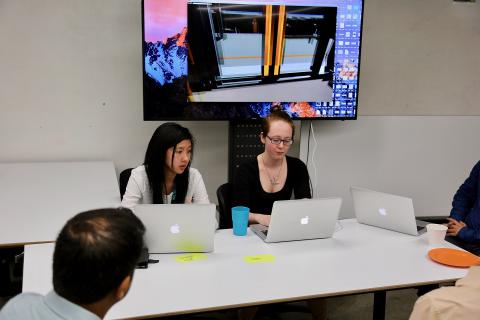You + AI + Games

Dr. William Raffe, along with Games Studio PhD candidates and undergraduate students, recently presented at the You + A.I. Creative Clusters series of UTS public workshops, organized by Leah Lucas and Claire Marshall from the UTS Innovation, Entrepreneurship, and Creative Intelligence Unit. The specific topic for discussion on the evening was "A.I. and the Future of Us", which focused on our changing relationship with intelligent machines and covered topics such as health, creativity, and ethics.
.jpg)
William spoke on the role of game A.I. research and practice within the context of our changing relationship with A.I. systems. He spoke briefly on the importance of games for A.I. research, discussing why they make such suitable test-beds and the significance to the rest of the world when major milestones in game A.I. are achieved, such as the 2015 victory of AlphaGO over a professional Go player and the recent advancements of AlphaGo Zero. He also spoke about the broader scope of A.I. research in digital games, including competitive agents, believable agents, dynamic difficulty adjustment, personalized procedural content generation, and player modelling in games for topics such as churn and in-game behaviour analysis. Also presenting at the evening was Assoc. Prof. Paul Kennedy on the use of machine learning for predicting success of cancer treatment in children, Dr. Oliver Bown on the state and future challenges of computational creativity, and Dr. Kirsty Kitto on our historical view of machines and data and how that mind set still guides our perception of the future.
.jpg)
Also on show we an array of smaller break-out demo presentations by academics, students, and industry on a range of A.I. topics. Chen Si, who recently submitted his PhD thesis with the UTS Games Studio, demonstrated his work on human-like agent navigation in real-time strategy games like StarCraft. Georgette Tabor and Natassja Sundara, undergraduate students from the UTS Bachelor of Science in Games Development, presented their assessment work from the Introduction to Games Programming subject in which they created an A.I. for a stealth game, utilizing line-of-sight detection, finite-state machines, and agent-to-agent communication. Also on show was the work of RMIT PhD student Simon Demediuk (presented by Dr. William Raffe), which utilizes a modification to the action selection in Monte Carlo Tree Search to create a dynamic difficulty adjustment system.
(Photos kindly provided by Leah Lucas)
.jpg)
.jpg)
